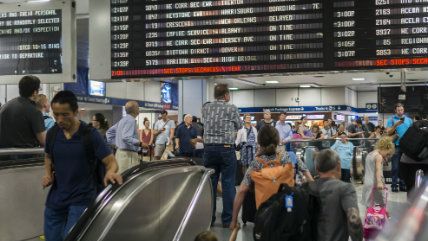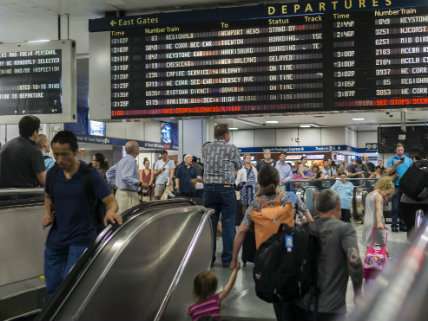With Amtrak Subsidy, Biden Takes Taxpayers for a Ride
If Acela is such a great business, why does the federal government need to loan it money?


Pretty much everything that's wrong with government is encapsulated in the recent announcement of what The New York Times described as a "$2.45 billion loan" to Amtrak to buy new Acela trains to replace the ones that currently ride the rails between Washington, New York, and Boston.
To start with, there is the lack of humility. The Times reports that "Vice President Joseph R. Biden Jr., a longtime Amtrak supporter who frequently travels by train between Washington and his home in Delaware, announced the loan at the station in Wilmington that is named in his honor." Sure enough, Amtrak in 2011 renamed the Wilmington Delaware station the Joseph R. Biden Jr. train station. Biden, in attendance at that event, reportedly protested, "the truth is, I don't deserve this."
The modesty implied by Biden's accurate statement apparently didn't extend to his either declining the honor or declining to appear at the event. Every once in a while a politician in Washington tries to pass a law preventing the government from naming things after living politicians, or at least those who are still in office. Adopting such legislation might make America feel a bit less like Stalingrad. But no such law has been enacted.
Then there's the lack of a stable dollar. The first set of Acela trains, deployed about 15 years ago, cost about $1.2 billion; the new set will cost about twice that. Is today's dollar worth half what it was worth 15 years ago? Or do these rapid price increases apply only to things the government subsidizes, like health care, college education, and passenger railroads, and not to the part of the economy in which many of us earn our wages?
If Acela is such a great business, why does the federal government need to loan it money? Why can't it raise funds the way other, competing, businesses, like airlines do, by selling bonds or issuing stock?
Instead what's happening is the government is backing one competitor in the market for travel between Boston, New York, and Washington.
It just so happens that, as someone who lives in Boston but travels frequently travel to New York and Washington for work and family reasons, I have some experience with this route. (I've also lived in New York and Washington.) I've tried flying on a variety of airlines. I've tried taking the bus. I've tried driving it myself. I've tried driving to New Haven, Connecticut, parking there, and then taking a MetroNorth commuter train. I've tried both the Acela and the slower "northeast regional" service, which seems a lot like what used to be Amtrak's faster and fancier Metroliner service.
Unfortunately, there's no perfect way to make the trip. If the plane works, it's faster, but if you get caught in a rain or snow or wind delay or miss the flight because of a ridiculously long security line, then the plane takes longer. Sometimes driving is faster door-to-door, but if you are driving it's harder to get much work done while traveling. The bus is the cheapest but it takes longest. Sometimes if you book in advance flying is even less expensive than taking the train.
The idea of putting any federal tax dollars at all to work to shave a few minutes off one particular method of making this trip seems, to me at least, to be an odd one. Arguably, I might be among the beneficiaries. But that brings us to a final flaw with government: unintended consequences. Government "investment" — the preferred euphemism for borrowing, taxing, and spending—in Amtrak may have the perverse effect of making it less profitable for airlines to run competing flights, and less profitable for private entrepreneurs to invest in competing technologies, such as a hyperloop. If that's the case, then Amtrak will be able to jack up its prices. The railroad already has the benefit of not subjecting its customers to the invasive security screenings that the government requires of airline passengers.
Acela passengers, in other words, may think they are getting a subsidy. But they're really being taken for a ride, deprived of the speed provided by the innovation and competition of a genuinely free market.


Show Comments (52)